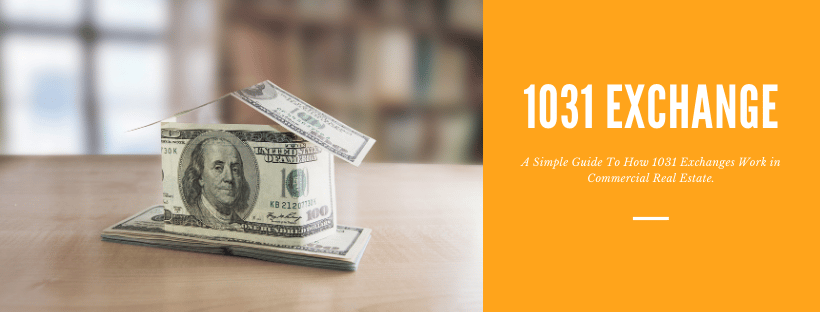A Simple Guide to 1031 Exchange In Commercial Real Estate

Imagine you bought a multi-family home as an investment and rental property. Years later, you’ve made some upgrades and are ready to sell it for a bigger investment.
But when you realize how much you could pay in capital gains taxes, you wonder if selling is the best option. Luckily, a 1031 exchange commercial real estate transaction lets you avoid those taxes.
Keep reading to learn about a 1031 exchange and how it can help you.
Section 1031
A 1031 exchange comes from Section 1031 of the U.S. Internal Revenue Code (IRC). The tax code lets commercial property investors defer taxes when they sell a property.
It does not apply to personal property, but it can apply to residential property, such as multi-family homes and apartment complexes.
Using a 1031 exchange for commercial property allows investors to use the profits of a sale to buy a new property. You don’t have to pay the capital gains tax on the old property, giving you more money for a down payment on your next investment.
While you don’t have forever, you can take time to find your next property. Then, you can make sure you invest in the best commercial real estate for your business.
Using a Qualified Intermediary
A qualified intermediary is a third party you must use with a 1031 exchange for commercial real estate investments. Your qualified intermediary will act as the seller of the property, and they will buy the new property for you.
During that time, the third party will prepare all of the documents and manage the finances. A qualified intermediary also needs to make sure the transaction follows the 1031 exchange rules so that you can enjoy the tax benefits.
You cannot use a 1031 exchange without hiring an intermediary. However, you also want to hire someone you can trust.
Ask other commercial real estate investors for their recommendations on professional intermediaries. Make sure whoever you hire has insurance that will protect you in case of negligence or fraud.
Using a 1031 Exchange for Commercial Real Estate
If you want to buy a new property for a business, a 1031 exchange for commercial real estate is an excellent option. You can save money on taxes and invest the difference in a new location.
Perhaps you want to move locations or start a new business. No matter your reasons, you need to understand the rules of a 1031 exchange.
You can’t use 1031 for just any commercial property. You have to meet a few conditions to qualify for the tax benefit. Then, you can look for the right loan program to cover the difference in cost for your new property.
Required Conditions
To qualify for a 1031 exchange, the new property has to be for rental or investment, or you can use it for a business or trade. You can’t use the tax code when buying or selling your personal home unless it’s a multi-family home that you rent out.
The property you buy and the one you sell must be like-kind. Such properties can differ in quality or grade, but they must be of the same nature or character.
For example, you could exchange a shopping center for another. Both properties also have to be in the United States to qualify for a 1031 exchange.
The transfer of property also has to happen within 45 to 180 days. After you sell the old property, you have 45 days to find a new property. You’ll have a total of 180 days from the sale to buy new real estate.
Finding a Replacement Property
When using a 1031 exchange, you can find one or more replacement properties. You can also sell one or more properties.
If you want to buy multiple properties, you can choose up to three properties to purchase. However, you can choose more than that as long as the total value does not exceed 200 percent of the old property’s value.
You can get around that restriction if you acquire at least 95 percent of the properties you identify, so you can still qualify for a 1031 exchange. When you find replacement properties, you will notify your qualified intermediary.
Then, you can negotiate to buy the new property or properties. If you don’t close the sale on the like-kind properties within 180 days, you won’t be able to take the tax deferral.
Timelines for a 1031 Exchange for Commercial Property
Unfortunately, you can’t spend a ton of time searching for replacement properties. After about six months, you won’t qualify for a 1031 exchange for commercial property.
If you want to avoid paying capital gains taxes and minimize future commercial real estate debt, you should consider your timeline. You can follow the normal timeline or a reverse 1031 exchange.
The normal timeline starts as soon as you sell your old commercial property.
Your qualified intermediary will handle the sale and proceeds, and you can look for new properties for the next 45 days. You’ll then have a total of 180 days to buy the new property.
The reverse timeline looks relatively similar, but you start with buying the replacement property. After you buy, you’ll have 45 days to determine the like-kind property to sell. You’ll have a total of 180 days to sell that property.
Benefits of a 1031 Exchange
You can benefit from a 1031 exchange no matter where you live or the properties you currently own. Whether you want to defer taxes or restructure your investments, Section 1031 can be useful.
Before you start a 1031 exchange, you should consider the benefits. Then, you can make sure you complete the timeline to qualify.
Tax Deferral
Depending on the value of the property you sell, you could save a lot of money on deferring capital gains taxes. For example, consider if you bought a property for $100,000 and sold it for $120,000.
When selling it as normal, you would have to pay a capital gains tax on that extra $20,000. But if you follow the rules of a 1031 exchange, you can avoid that tax.
You can then use that extra money to put toward your new investment. That way, you can increase your profit and make the new property investment successful.
In the future, you can keep using the 1031 exchange to defer taxes on the new property. You’ll only need to pay capital gains taxes when you don’t meet the terms of an exchange.
Depreciation
Over time, your real estate investments will decrease in value or depreciate. You can write off the cost of the depreciation on your taxes each year.
But at some point, the property will depreciate enough that you will have to recapture the depreciation. The depreciation amount will be part of your taxable income when you sell the property.
However, using a 1031 exchange can encourage you to invest in new property more often. You can use the tax code to avoid paying taxes on the capital gains, especially when you sell the property for more than its depreciated value.
Be sure to work with an accountant to recapture depreciation. That way, you can see how much you can save on taxes with a 1031 exchange for commercial real estate.
Consolidate Assets
If you have a lot of commercial real estate, you may want to consolidate your assets. As long as you find a property that follows 1031 rules, you can exchange your many properties for a single one.
Consolidating your assets is useful if you don’t want to spend as much time on management. You don’t have to worry about keeping up with multiple investments.
You can also consolidate if you plan on moving. It can be hard to manage real estate from afar, so you can hire one person to manage your new investment.
Divide Assets
On the other hand, you may want to diversify your investment properties portfolio. If you have one investment in a major shopping center, you may want to reduce your risk of it failing.
So, you can use a 1031 exchange to sell the massive property and buy multiple smaller ones. That way, you can still invest, but it won’t be a huge issue if one of your investments doesn’t profit as well.
Ensure you know the value of your current property and start looking for new investments before you sell. That way, you can find the properties and buy them before the 180 days are up.
Change Between Residential and Commercial
It may not seem like it, but you can do a 1031 exchange residential to commercial property and vice versa. You have to make sure both properties are like-kind, but they don’t have to serve the same purpose.
The key is that they are both “real” property, so you can’t exchange a multi-family home for a single-family home for you to live in. But you can exchange a multi-family home for an apartment complex.
Both properties are investments for business, so they fall under like-kind properties. If you aren’t sure if properties qualify, you can ask your qualified intermediary for help.
That way, you can make sure you follow the 1031 exchange rules.
Reviewing a 1031 Exchange Commercial Real Estate
A 1031 exchange commercial real estate is an excellent move for any commercial investor. You can buy a new property while avoiding capital gains taxes from the sale of your current investment.
The exchange requires a qualified intermediary to manage the sale and purchase of your property. You can still earn profits from your sale, and you can get a loan to help fund the new investment.
Do you need help paying for the new property? Contact us for a loan quote today.

